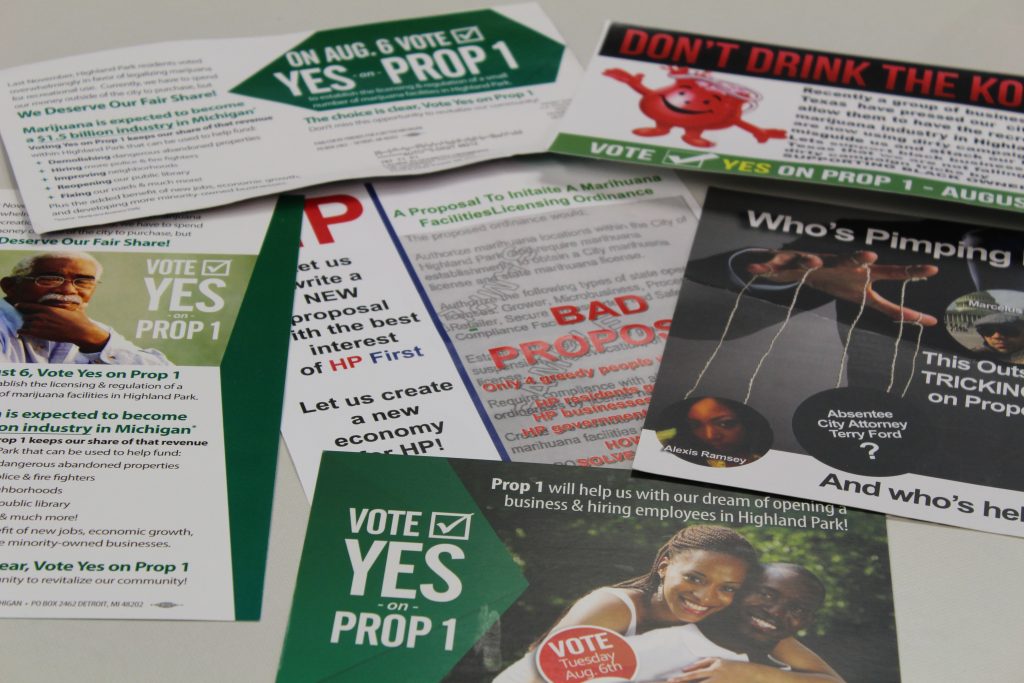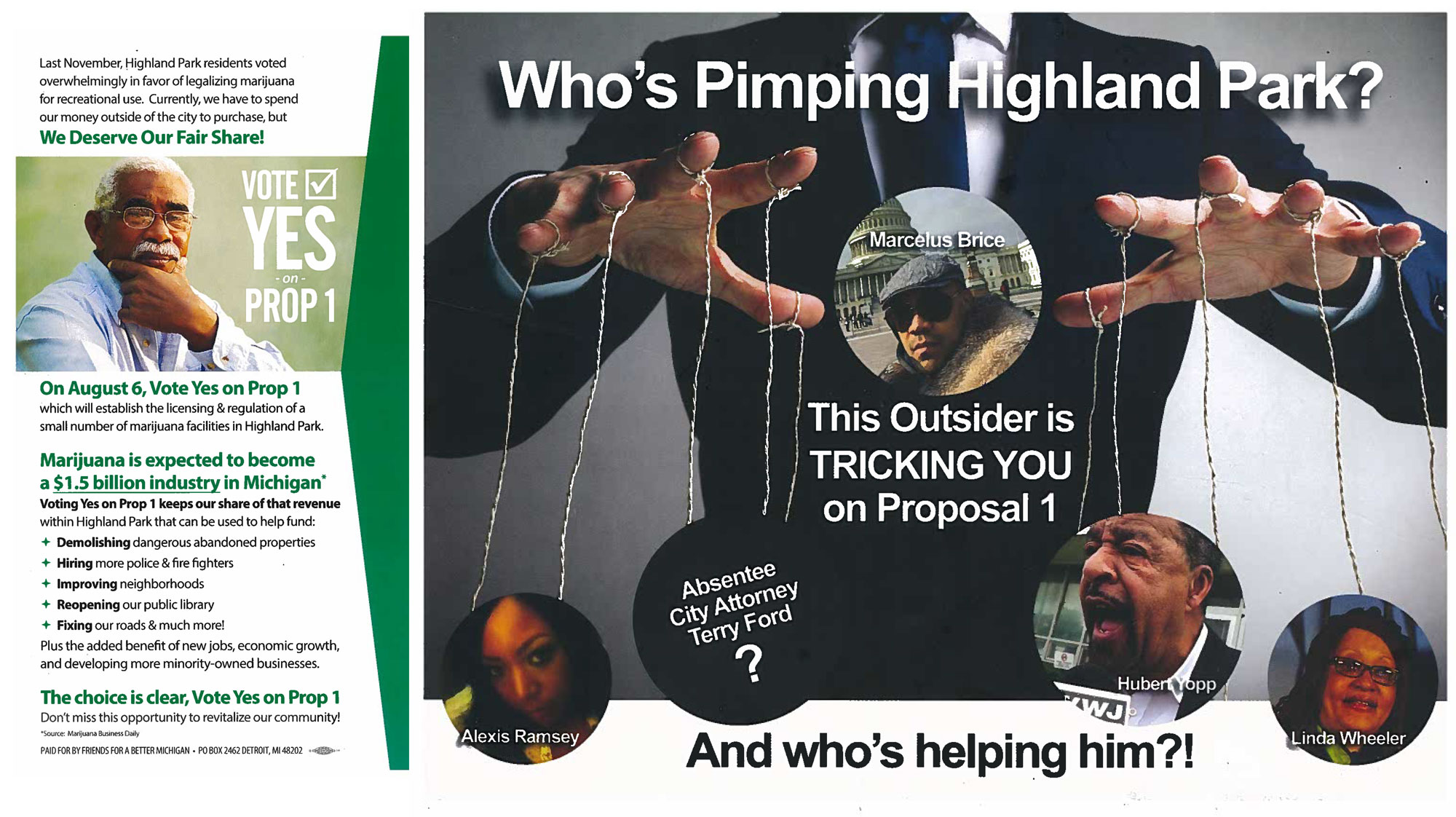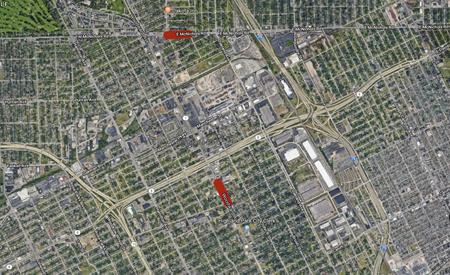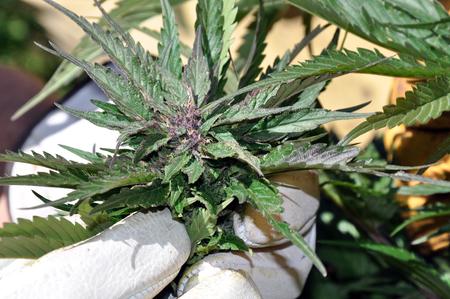The Man Who Wants to Make Highland Park His Marijuana Headquarters
On Tuesday, Highland Park residents will vote on Prop 1, an ordinance regulating recreational marijuana businesses in the city. Critics allege its chief backer is just out to make money.

This Tuesday, Highland Park residents will vote on Prop 1, a proposed ordinance that lays out guidelines for marijuana industry operations within its borders. But the ordinance, and its lead backer, has sparked conflict in the 2.97 square-mile city entirely bordered by Detroit.
Since marijuana was legalized at the state level in last year’s referendum, local municipalities have to decide what that looks like in their backyards.
Highland Park’s Prop 1 would:
- Allow for an unlimited number of marijuana growers, processors, transporters and safety compliance facilities, but would limit the number of retail establishments to two establishments in two designated zones.
- Establish a five member marijuana board chaired by the City Attorney and members appointed by the Mayor and City Council, who would would decide if businesses would be granted or denied licenses to operate in Highland Park. Some felonies and misdemeanors would be grounds for denial, as well as the board’s consideration of an applicant’s moral character, community involvement and whether or not they’ve filed for bankruptcy in the past seven years.
- Create operational regulations, including a ban on smoking onsite and a 9:00 pm closing time for businesses.
Read the full ordinance here.
But the upcoming vote has sparked a debate about the role of the marijuana industry in Highland Park, with criticism focused on its chief backer, Marcelus Brice, an entrepreneur from Detroit who has dabbled in local politics through a Michigan House run in 2012 and registering as a Detroit city lobbyist in 2017. Critics argue that Bryce would financially benefit from the ordinance passing since he is in the process of purchasing a building in one of the two zones designated for marijuana retail.

To which Brice responds: Yes.
“We wanted to put something together that the city would benefit from,” Brice said. “But at the same token, yes, I would like to be able to participate in the marijuana industry in the city of Highland Park. Not just in the retail outlet, but we’re also looking at buildings there to do a large grow, to do processing where you take the marijuana and turn it into an oil or something edible.”
“We’re looking to do everything” in Highland Park, he continues. “We want to make that our headquarters.”
WDET’s Laura Herberg, a Highland Park resident, interviewed Brice about the ordinance, why he brought it forward and who stands to benefit if it passes.
Click on the player above to hear WDET’s Laura Herberg interview Marcelus Brice about Highland Park’s marijuana ordinance, and read excerpts, edited for length and clarity, below.
WDET: Tell me about Prop 1.
Marcelus Brice, entrepreneur: The State of Michigan has classified the marijuana industry for recreational into several different categories. You have the retail outlet, the testing centers, the growers and transportation. We wrote an ordinance that ‘unlimited’ all of these facilities. The City of Highland Park can have as many growers, they can have as many transportation, they can have as many testing centers. When it came to the retail we decided to limit it to two. And I’m going to tell you why.
I have a very unique experience with this industry, given my background in government relations and as a participant and an owner that does business in this industry. I can kind of see both sides.
I did not want to come to another black city and over-concentrate it with a controlled use. We just didn’t want to do that. So, what we did was, we limited to two retailers, which we think is more than enough. To be honest with you I really only wanted to do one. We don’t need a marijuana shop on every corner in Highland Park. We just don’t.

And we put those two in two “overlay districts” that was outside of a neighborhood because we did not want to overburden neighborhoods with the commercial traffic that these businesses have.
These retail businesses, on average, see about 500 customers a day. That’s a lot of moving vehicles. And so there’s only three streets in Highland Park that can handle that kind of traffic: McNichols, Woodward and Hamilton. The reason why we didn’t want to put them on Hamilton is – you could say this is a little selfish for me, but – coming from the business aspect, Hamilton does not garner enough traffic or attention for a marijuana shop to thrive. And so that’s why we didn’t do Hamilton. And that’s why we did Woodward.
I believe you’ve said that you rent in one of the areas. Is that correct?
No, I have a building under an option agreement which basically says that if I’m able to get this building licensed then I will purchase it. But I don’t own any property in the City of Highland Park.
For those of us who don’t understand, what’s a real estate option agreement?
An option agreement is basically if you had a building and I said, “Hey, I want to buy this building, but I don’t want to buy it today, I want to buy it six months from now. So I’ll pay you to take this building off the market. And I’ll pay you for an option in, so you can’t sell it to anyone else.”
So if this moves forward it would be in your best interest to move forward with that agreement and purchase that building, correct?
Well, I mean, in order to be able to put in the application [for a marijuana retail business] you have to have a location. So yeah, it would be in our best interest to do that.
And that would be your plan if this goes through, correct?
Yes, if this goes through.
We wanted to put something together that was fair to the city. We wanted to put something together that the city could benefit from. But at the same token, yes, I would like to be able to participate in the marijuana industry in the City of Highland Park. Not just in the retail outlet but we’re also looking at buildings and warehouses there to do a large grow. We’re looking at places to do processing, where you take the marijuana and you turn it into oil or something edible. So, yeah, we’re looking to do everything there. We want to make that our headquarters and we want to put a lot of money there.
But, the ordinance is really a good ordinance. I’ve heard the things out there that they say, “This is only going to benefit one group.”
Let’s be honest, we don’t know who this is going to benefit. The way I look at it is if I want to do business in Highland Park in marijuana, first the city must opt in. If they don’t opt in I have no opportunity whatsoever. At least if they opt in I [have an] opportunity, but it’s not guaranteed.
By our calculations, we think the City of Highland Park is going to take in an extra $3 to $5 million dollars annually, forever, as long as those businesses are open and operating.
Is that just off of the two retail establishments?
No! That would be off of everything. The retail is not really the big picture for the city. The really big picture for the city is going to be these grows.
I noticed in the ordinance it says, “Information a municipality obtains from an applicant related to licensure under this section is exempt from disclosure under the Freedom of Information Act.” Why did you want to include that?
Okay. So that is typical of the state law and of most of the other cities too. A resident from Highland Park brought that issue up to me like, “Oh, we can’t know what’s going on.” And that’s not true.
The State of Michigan wants a copy of three years worth of monthly bank statements. So you don’t really want people being able to have that information like that. But as far as who’s the owner and what’s the business name and all that, all of that is public information.
But if it’s public information, it’s public through the Freedom of Information Act. And it sounds like this is saying that even that public information would not be available.
No, I don’t think it says that. I would have to revert back to the attorney who wrote it for us, who put that in there for legal reasons so that anybody who submitted an application’s whole life is not just given to the public.
One final question… if this passes, and you can purchase your building, are you going to make money?
Well, I mean, no one goes into business not to make money, so yeah, it would be nice to make money. But more important than that, it will be nice to be a good community partner.

